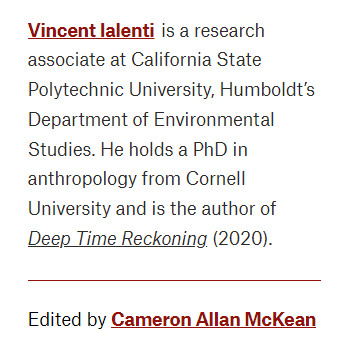Do you find the 21st century overstimulating? Try 'longstorming'

As the treadmill of life speeds up, sublime outdoor spaces help us tap into timescales that are longer, slower, planetary
https://psyche.co/ideas/do-you-find-the-21st-century-overstimulating-try-longstorming


Our experience of time is changing. For the philosopher Byung-Chul Han, the early 21st century has left us ‘whizzing without a direction’. Our world is shaped by the restless, disorienting rhythms of near-term deliverables, social media impression counts, technological obsolescence, shallow electoral cycles, rapid news cycles, frenzied culture wars, sudden stock market shifts, gig economy hustles, and occupational burnout. Though it all seems exhausting and unmanageable, the whizzing isn’t slowing: digital platforms now bombard us, minute by minute, with fragments of information that fail to cohere into meaningful narratives, and algorithms that hijack our neurochemical reward systems. As the treadmill of post-industrial society speeds up, some of us have become so addicted to the stimulation that we struggle to imagine another way to live: psychological research shows that most people would rather receive electric shocks than sit quietly alone with their own thoughts. In his book The Scent of Time (2017), Han borrows a concept from Marcel Proust – une époche de hâte – to describe our overstimulated moment. The ‘age of haste’ has arrived. And its problems are pervasive.
When time whizzes by, individual moments blur together and we stop contemplating how each fits into broader arcs of history. We forget, Han laments, to engage in slower-moving forms of cognition such as wonder, curiosity and introspection. We forget how to reflect and be still. But what can we really do about the age of haste? For many of us, a slower, more contemplative life often feels unattainable. You may feel trapped by the directionless whizzing of the 21st century – trapped on an accelerating treadmill. Can you forge a new relationship with time? Perhaps your first impulse is to find ways of escaping the age of haste. This is a mistake. We cannot simply break free by ‘exiting’ the world we inhabit. Confronting time requires more engagement with the wider world. This world, however, is not the one defined by near-term deliverables and neurochemically disrupting algorithms. It is the one that reveals itself when you glimpse the Milky Way on a cloudless night. It is the world that becomes clear when you gaze upon a mountain.
Encountering spectacular natural environments can cause a radical shift in how we think about ourselves and the world. According to the psychologist Dacher Keltner, feelings of awe, especially those inspired by natural scenery, can make us feel more collaborative, less egoistic, more altruistic, and more open to social connection. Over the past two decades, Keltner tested this idea through a series of experiments that examined how a person’s attitudes and behaviours change after experiencing awe-inspiring places or things. He found that natural splendour seems to put us in a headspace that lets us reflect on our short lives as ephemeral organisms dwelling on a fragile planet floating in a vast cosmos. This way of thinking can be transformative, but its power is not a recent discovery. Greco-Roman Stoic philosophers, for instance, encouraged retreats into the countryside to proactively ponder life. Venturing into breathtaking outdoor spaces seems to help us step back, slow down and, most importantly, think in the long term. I call this style of thinking ‘longstorming’ because encounters with sublime geophysical and ecological environments can invite the mind to brainstorm about our long-term futures and pasts.
Brainstorming is a technique that was developed by the advertising executive Alex F Osborne in the 1950s. This technique, as Osborne explains in his book Applied Imagination (1953), involves generating a stream of new ideas by riffing about bold plans or even proposing outlandish hypotheticals. Osbourne’s goal was to help employees come up with creative proposals for advertising campaigns, but brainstorming has since become a widely used tool for generating new ideas in all types of contexts. Brainstorming also works well – perhaps even better – out in the wilderness, under vast constellations of stars, where the mind is calibrated to contemplate the deeper timescales of our planet and universe. I believe that purposefully longstorming can help us retool how we relate to time itself. Outdoors, in a headspace better suited to imagining possible scenarios in hypothetical past and future worlds, we can find a way beyond the immediacy of the age of haste.
snip
Ocelot II
(120,815 posts)far away from light pollution from the city and other people. I was out on a country road alone in the dark looking at this phenomenon that was more immense than I could imagine. I still don't have words. I guess that was longstorming. On a much less cosmic scale I like to hang out at a nearby bird sanctuary - there's a Japanese expression, shinrin yoku, forest bathing. Same idea. Gets the dust out of your head.
Celerity
(46,183 posts)Ocelot II
(120,815 posts)It's kind of a thing in this part of the U.S. as well.
Celerity
(46,183 posts)NewHendoLib
(60,496 posts)when not doing that I am in my garden, or reading to my wife, or we are listening to a book on our Alexa. We are living the life we love - and I realize how lucky we are. The TV is never on, but there is music going nearly 24 hours daily.
hlthe2b
(106,330 posts)ducks and geese with their young, but also (amazingly enough for landlocked Colorado), pelicans and blue herons (very pterodactyl-like) in the summertime. One year we had a set of swans. These are waterfowl I don't remember seeing much even in our more ocean-adjacent Southern states in years past... But the dawn silhouettes are spectacular--accompanied by the sounds of bullfrogs and the ubiquitous darting wild rabbits. My dog and I, usually joined by a friend who meets me with his dogs, get a special treat each morning that most in our community don't see.
Very grounding and sanity-preserving. But, I cannot agree more about how time has been impacted. At least for 60-90 minutes each morning, I can escape that. ![]()















